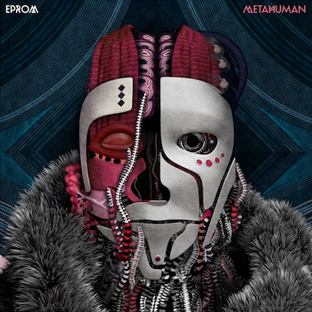Dubstep as it’s known most commonly in 2012 is a dance music fan’s worst nightmare. The bad dream isn’t the face value success or ubiquity of an unlikable style of music whose name used to mean something grassroots and progressive. Rather, it’s the “dubstep” music itself which lives and dies by surface-level intensity and corrosive stylistic stagnation. It’s the abstracts the music represents that sit as an antithesis to dance music’s vital and rabid need for change, individual identity, and progression.
But here we are with Metahuman, the full-length debut of San Francisco’s Alexander Dennis who, as Eprom, produces sagging and pristine bass-heavy dubstep and hip-hop mutations. It’s maximalist rave in the style of compatriot producers like Rustie and Lone. Metahuman reminds me where the lines between homogenized heaviness and vigorous personality are drawn. The record is tonally and emotionally diverse, intricately and immaculately sculpted, even beautiful in places; but it’s still crunk as shit and strangles the hell out of some throbbing bass synths.
It’s also pretty weird, in its own way. You can trace a lot of Metahuman to hi-hat splattered hip-hop and much of dubstep’s introverted, metropolitan paranoia. It’s bruiser of a first half is even stylistically straight-forward, riding along rubbery subterranean bass lines and populating its glass-sculpture atmosphere with chittering, bitcrushed intricacies and “riding low, getting high”-centric vocal samples. But Eprom operates within a cloud bank of negative space, and the attention to detail would be clinical if it wasn’t so delicious, while the producer’s rhythms can be unpredictable and downright mean. “Honey Badger” opens the LP with some computerized, cascading rainstick textures before a squelching, vertically zigzagging synth melody chases a tempo-challenged kick and a crashing, broken-glass snare. “Prototype,” the first floor-centric track on the record, opens with a belching, baritone synth drone before it drops into a grime-y, earth-crushing banger full of shuddering bass and cyborg-ian 8-bit synth textures.
Around “Floating Palace” Eprom changes direction toward more melodic and musically complex territory without sacrificing the bodily, throttling command of his programming ability. Suddenly, Metahuman is working on more intellectual and emotional impulses. “Floating Palace” is full of tropical, serpentine synth squalls reminiscent of the aforementioned Rustie while “Transparency” and “Love Number” are closer to James Blake’s CMYK days, with their spats of silence and chewed vocal samples but way heavier and packed with a little more dragging-kick swagger. “Vibrations” is an oddity, its spindly synth hook tinged with some eastern European folk influence, further cemented by its 4/4 clap-along rhythm and an acoustic guitar sample near its end.
Then there’s “The Golden Planet,” which moves from a roughly smothered barrage of unbalanced kick and rapidfire 8-bit lacerations to a sequenced, arpeggiated rave party. Along with “Sun Death”, it’s probably the heaviest cut on the album, but its so dexterous and unstable that, if thoughts happen to wander (unlikely), it’s hard to remember where mainstream dubstep’s commonalities might interlock. It’s also hard to care. Metahuman is truly different, even as a part of the larger dance music landscape. There’s something to be said about how arduously designed it all sounds. Beyond production detail and song construction, Eprom entrenches himself wholly in the disconnected stillness that surrounds almost every texture on the record. More than a few producers have effectively dialed silence into their arsenal, but Eprom somehow uses it as the driving force, turning fractured rhythms and luminescent synths into tightly gritted, scattered-litter abstractions.

